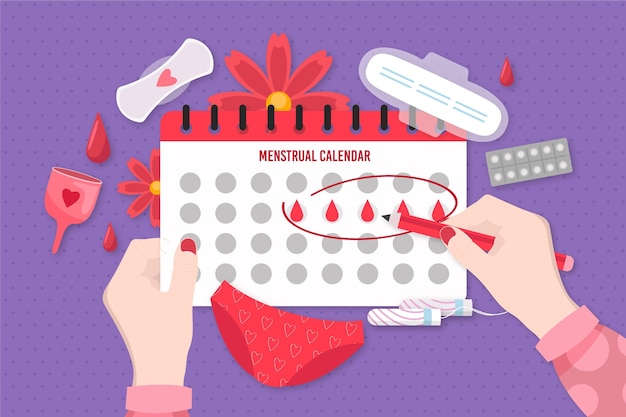
Are you waiting for your period and feeling concerned because it’s late? Before jumping to conclusions or worrying about pregnancy, it’s important to know that there are many reasons why your period may be delayed. Sometimes, it’s simply due to everyday factors, while other times it may be related to underlying health issues.
A woman’s lifestyle has a significant impact on her menstrual cycle. Factors like stress, weight fluctuations, or changes in routine can cause periods to show up later than expected. Additionally, there are natural phases in life when irregular periods are considered normal, such as the early years after menstruation begins or during the transition to menopause.
If you’re trying to figure out why your period may be late, here are some possible reasons:
### 1. Birth Control Pills
Using birth control pills can disrupt your menstrual cycle, causing delays or even skipped periods. These pills contain hormones like estrogen and progesterone, which stop ovulation. Once you start or stop taking them, it may take up to six months for your cycle to return to normal. Other contraceptive methods, such as IUDs or hormonal implants, can also influence your period.
### 2. Thyroid Issues
Thyroid problems—whether it’s hyperthyroidism (overactive thyroid) or hypothyroidism (underactive thyroid)—can impact hormone levels, potentially delaying or preventing ovulation. This results in irregular periods, but with proper medical treatment, this issue can usually be managed.
### 3. Polycystic Ovary Syndrome (PCOS)
PCOS occurs when higher-than-usual levels of male hormones (androgens) interfere with ovary function, leading to missed or irregular periods. Common symptoms of PCOS include excessive body hair, acne, weight gain, and, in some cases, hair thinning or baldness. If not treated, PCOS can increase the risk of endometrial cancer. Fortunately, medications and lifestyle changes can help regulate the cycle in most women with this condition.
### 4. Diabetes
Uncontrolled diabetes can disrupt hormonal balance, affecting ovulation and causing irregular menstrual cycles. Women with diabetes may notice more frequent delays or missed periods.
### 5. Hormonal Imbalances
Hormones like thyroid hormones or prolactin play an important role in regulating periods. If these hormones are imbalanced, it can lead to delayed or absent menstruation. A blood test can reveal hormonal imbalances, and treatment can usually restore a regular cycle.
### 6. Stress
Stress can have a major impact on your period by suppressing the production of hormones needed for ovulation. This can lead to skipped or delayed cycles. Practicing stress management techniques like yoga, meditation, and maintaining a consistent sleep schedule can help. If stress persists and continues to affect your periods, seeking medical advice is recommended.
### 7. Changes in Sleep Patterns
Sudden or frequent disruptions to your sleep schedule can confuse your body’s internal clock, leading to irregular periods. Women who frequently switch between night and day shifts or experience jet lag may notice these changes. If sleep disruptions are affecting your cycle, it’s a good idea to talk to a healthcare provider for guidance.
### 8. Breastfeeding
After giving birth, many women experience delayed or irregular periods, especially when breastfeeding. This is a normal response to the body’s hormonal adjustments and typically resolves on its own.
### 9. Weight Changes
Significant weight gain or loss can disrupt your menstrual cycle. Excess body fat produces extra estrogen, which can delay ovulation, while very low body fat (commonly seen in underweight women or athletes) can stop periods altogether. Restoring a healthy weight often helps regulate periods.
### 10. Excessive Exercise
While exercise is great for your overall health, overdoing it can lower estrogen levels. This can disrupt your cycle, sometimes leading to secondary amenorrhea (when your period stops for six months or more). Moderating physical activity and consulting a professional can help prevent this issue.
### 11. Perimenopause
Perimenopause marks the transition to menopause, during which periods become increasingly irregular. This phase can start as early as a woman’s late 30s or early 40s, lasting for 10–15 years. During this time, fluctuating estrogen levels are a common cause of delayed or missed periods. While pregnancy is less likely during perimenopause, precautions should still be taken until menopause is confirmed (defined as going 12 months without a period).
### When to Contact a Doctor
If you’ve confirmed that you’re not pregnant and your period remains irregular or absent for two or more consecutive months, it’s important to see a doctor. Irregular cycles can be a symptom of underlying health concerns that require medical attention. Pay special attention to the following signs, which may indicate a more serious issue:
– Heavy bleeding with unusual color or odor
– Severe abdominal or vaginal pain
– Blurred vision
– Persistent hair loss
– Fever, nausea, or vomiting
– Unexplained milk production in non-breastfeeding women
– Bleeding during menopause (if you’ve gone over a year without a period)
– Bleeding lasting more than seven days
A normal menstrual cycle ranges from 21 to 35 days. Any significant deviation from this may signal a potential health concern. Instead of guessing or hoping the issue resolves on its own, consult a healthcare professional. Early detection and treatment can often address the problem before it becomes more serious. Remember to listen to your body and prioritize your health!